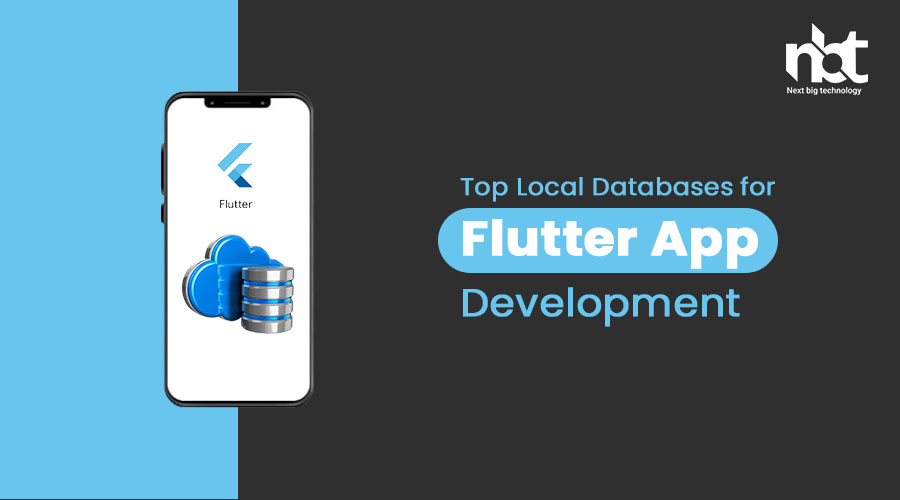Introduction: Flutter has gained immense popularity as a cross-platform app development framework due to its ease of use, performance, and rich UI capabilities. When developing Flutter apps, incorporating a reliable and efficient local database is crucial for managing and persisting data locally on the device. In this blog, we will explore the top local databases for Flutter app development that offer seamless integration, robust features, and excellent performance. These databases provide developers with the flexibility to create offline-capable apps, improve user experience, and ensure data integrity.
- Sqflite: Sqflite is one of the most widely used local database solutions for Flutter apps. It is a SQLite plugin that offers a simple and efficient way to store and query structured data locally. Sqflite provides a high-level API and follows the asynchronous programming model, allowing developers to interact with the database using SQL queries or object-relational mapping (ORM) libraries like moor or floor. With its excellent performance and wide community support, Sqflite is an ideal choice for small to medium-sized Flutter apps.
- Hive: Hive is a lightweight and fast NoSQL database for Flutter. It is designed for simplicity and performance, making it suitable for both small and large-scale applications. Hive stores data in a binary format, resulting in faster read and write operations compared to traditional SQL databases. It supports key-value storage as well as box-based storage for structured data. Hive also offers encryption and type-safe data access, ensuring data security and integrity. Its intuitive API and flexibility make it a popular choice for Flutter app developers.
- Moor: Moor is an open-source library that provides a fluent and typesafe database API for Flutter apps. It generates Dart code based on the database schema, allowing developers to interact with the database using compile-time checks. Moor supports SQLite as the underlying database engine and provides features like database migrations, efficient queries, and type-safe data access. It also integrates well with Flutter’s reactive programming model, enabling seamless updates to UI when the database changes.
- Firebase Firestore: Firebase Firestore is a cloud-hosted NoSQL database offered by Google. Although it is a cloud-based solution, Firestore also provides offline capabilities, making it suitable for Flutter apps that require real-time synchronization and offline data access. Firestore offers a flexible data model, real-time updates, and robust security features. It integrates seamlessly with other Firebase services, such as Firebase Authentication and Firebase Cloud Messaging, making it an excellent choice for building feature-rich Flutter apps with real-time data synchronization.
- ObjectBox: ObjectBox is a high-performance NoSQL database specifically designed for mobile and IoT devices. It provides an efficient object-oriented API for managing local data in Flutter apps. ObjectBox offers features like ACID (Atomicity, Consistency, Isolation, Durability) transactions, data encryption, and query optimization. With its focus on speed and efficiency, ObjectBox is well-suited for resource-constrained mobile devices, delivering excellent performance and low memory usage.
- Moor Flutter Web: Moor Flutter Web is an extension of the Moor library that enables local database support for Flutter web applications. It provides a consistent API for managing data across Flutter mobile and web apps, allowing developers to share code and database schemas seamlessly. Moor Flutter Web supports various web browsers and offers features like efficient queries, migrations, and type-safe data access. By leveraging Moor Flutter Web, developers can create powerful cross-platform Flutter apps with consistent local data management.
- Shared Preferences: Shared Preferences is a simple key-value storage solution provided by the Flutter framework itself. It is suitable for storing small amounts of data, such as user preferences or application settings. Shared Preferences operates on top of platform-specific APIs and offers a straightforward API for data retrieval and storage. While it may not provide the advanced features of other databases, Shared Preferences is lightweight, easy to use, and ideal for simple data storage needs in Flutter apps.
- Sembast: Sembast is a high-performance NoSQL database solution for Flutter that focuses on simplicity and speed. It offers a key-value store with support for structured data, allowing developers to store and query data using keys and indexes. Sembast provides ACID transactions, query capabilities, and data encryption. It also offers seamless integration with Flutter’s reactive programming model, making it easy to build reactive UIs based on database changes.
- SQLCool: SQLCool is a lightweight SQLite database wrapper for Flutter that simplifies database operations and provides a fluent API. It offers features like query builders, database migrations, and reactive streams for real-time data updates. SQLCool prioritizes developer productivity and aims to minimize boilerplate code, making it an efficient choice for Flutter app development.
- PouchDB: PouchDB is a JavaScript-based NoSQL database that can be used in Flutter apps via the Flutter PouchDB plugin. It provides seamless offline data synchronization and replication capabilities, allowing users to access and update data even without an internet connection. PouchDB is built on the CouchDB model, providing a JSON-based document storage approach. With the Flutter PouchDB plugin, developers can leverage the power of PouchDB in their Flutter apps, making it a suitable choice for offline-first applications.
Conclusion: Selecting the right local database is crucial for Flutter app development to ensure efficient data management, offline capabilities, and optimal performance. Sqflite, Hive, Moor, Firebase Firestore, and other local databases mentioned in this blog offer unique features and benefits, catering to diverse development needs. By understanding the strengths and use cases of each database, Flutter developers can make informed decisions and choose the most suitable solution for their specific app requirements. Leveraging these top local databases empowers developers to create robust, responsive, and feature-rich Flutter apps that provide a seamless user experience.










